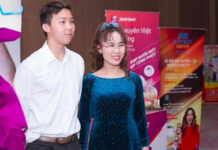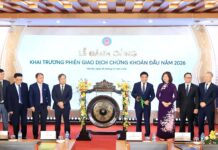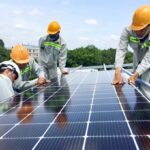Next week, the National Assembly will discuss several contentious issues regarding the proposed Social Insurance Law (amended) on the floor. The proposal to extend mandatory social insurance coverage to ride-hailing drivers and online delivery workers (shippers) has garnered significant attention.
Disadvantages and Risks
Anh Nguyen Thanh Hoang, a ride-hailing driver from Thu Duc City, Ho Chi Minh City, joined the industry before the COVID-19 pandemic. At the time, Anh Hoang had to present his personal documents, driver’s license, vehicle registration, and health examination results at Grab’s registration point. “Since then, I have never seen an employment contract,” he said.
Another driver from District 8, Ho Chi Minh City, shared that he had been working as a GrabBike driver for over five years but had not received any benefits from the company. “I don’t get a salary, bonuses, or social insurance coverage. When I’m sick and unable to work, the company evaluates my dedication, which affects my income. I also don’t keep a copy of the partnership agreement; instead, the company holds on to it,” he said.
Most ride-hailing companies confirmed that they do not sign employment contracts but rather business cooperation agreements for passenger transportation services. Gojek, one of the companies, considers this a new model without clear regulations, so they only sign cooperation agreements with drivers and provide accident insurance. Meanwhile, Grab has not provided a specific response on this issue.

Ride-hailing drivers currently face many disadvantages without guaranteed benefits. Photo: Tan Thanh
Mr. Le Tan Luu, Chairman of the Binh Tan District Motorcycle Taxi Association in Ho Chi Minh City, supports the proposal to include ride-hailing drivers or platform workers in the mandatory social insurance scheme. He explained that according to the 2019 Labor Law, ride-hailing drivers who agree to work for a company have an employment relationship. The company supervises and monitors their work through an app, and payment is based on the results.
According to Mr. Tran Van Trieu, Director of the Ho Chi Minh City Labor Federation’s Legal Counseling Center, despite various contract names, if there are signs of a wage agreement, salary payment, and management and supervision by one party, it is still considered an employment contract. There are sufficient signs to determine the relationship between the drivers and the ride-hailing companies as one between employees and employers.
Support with Concerns
Anh Nguyen Van Minh, a ride-hailing driver, supports mandatory social insurance participation but is concerned about the contract with the ride-hailing company, which is a cooperation agreement with a profit-sharing ratio and no fixed salary. He wonders what salary basis will be used for social insurance contributions and what the contribution ratio will be for employees and partners.
-

Record-high gas prices worry shippers: READ NOW
Attorney Dang Anh Duc of the Hanoi Bar Association supports including ride-hailing drivers in the mandatory social insurance scheme, given their risky work environment and disadvantages. However, he emphasizes the need for in-depth research to understand their working conditions, needs, and obstacles better. He also suggests encouraging service providers to support drivers in participating in the government’s social security programs, especially social and health insurance.
National Assembly Deputy Truong Xuan Cu (Hanoi delegation) believes that authorities and businesses should pay more attention to protecting the rights and interests of employees. He added that technology companies should also find ways to support drivers appropriately.
Meanwhile, National Assembly Deputy Ta Thi Yen (Dien Bien delegation) noted that most countries worldwide do not mandate social insurance for workers in the free economic zone. Therefore, she suggested thoroughly studying the application of mandatory social insurance for these workers. The draft Social Insurance Law (amended) aims to remove obstacles and make voluntary social insurance more attractive while ensuring social security for self-employed workers and establishing a legal framework suitable for new economic models without compromising their benefits.
International Recognition of Ride-Hailing Drivers as Employees
In the UK, ride-hailing companies like Uber are considered transportation service providers, and drivers are classified as self-employed workers. However, in 2021, the UK Supreme Court ruled that ride-hailing drivers should be treated as employees, entitling them to basic rights such as minimum wage, vacation time, and insurance.
Similarly, in Spain, the law requires ride-hailing companies to sign employment contracts with drivers, guaranteeing them a minimum wage, social security benefits, and other rights. In the US, New York City mandated in 2021 that ride-hailing companies increase drivers’ wages to a minimum of $17.23 per hour and provide benefits like health insurance and paid time off. Ride-hailing drivers in South Korea are also considered employees and enjoy full benefits.
Proposed Expansion of Mandatory Social Insurance Coverage
The draft Social Insurance Law (amended) also proposes expanding mandatory social insurance coverage to include preschool teachers, private pharmacists, and online sellers.
Nguyen Thi Lan Chi, an online seller of specialties from the Mekong Delta, shared that if her business performs well and generates stable income, mandatory social insurance participation would allow her to access welfare policies. However, online selling income can be unstable, and it would be challenging for both her and her husband to participate.
Huynh Ngoc Bich Son, Chairman of the Preschool Teachers’ Union in Ward 7, District 8, Ho Chi Minh City, expressed concern about the contribution rate. “We are willing to participate if the contribution rate is 10.5%, similar to employees in enterprises. However, a 25% contribution rate is beyond our capacity,” she said.
A pharmacist at a private pharmacy in Thu Duc City, Ho Chi Minh City, shared that she does not participate in social insurance because, after agreeing on the cost with the owner, her contribution amount is very high. She hopes that the proposal in the draft law will be passed so that she can enjoy better benefits.




































